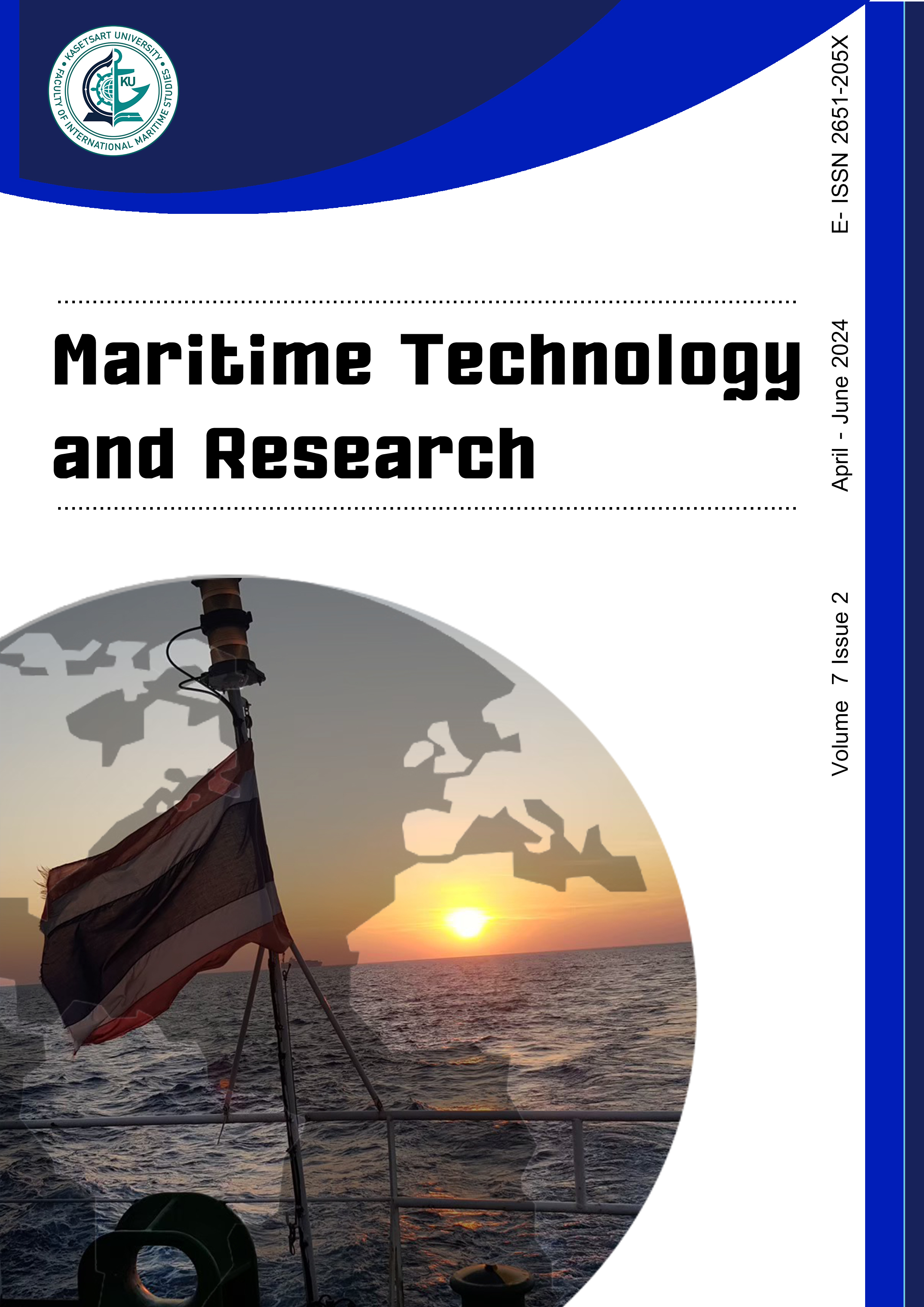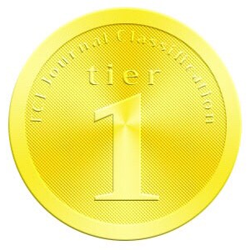Unveiling maritime English communication needs for seafarer: Strategic reformation for classroom instructional design
DOI:
https://doi.org/10.33175/mtr.2025.271921Keywords:
Maritime English; Communication needs; Seafarer; Instructional designAbstract
The significance of onboard maritime English communication has led to the need for innovation in language teaching strategies and instructional design. Indonesian seafarers have faced serious problems in joining ocean-going vessels due to lack of maritime English proficiency. This study attempted to capture the essential demands of Indonesian seafarers joining an ocean-going vessel for their communication techniques using maritime English, with the goal of having greater impact on the development of instructional design for the Indonesian curriculum. Semi-structured interviews were conducted with 14 Indonesian seafarers assigned to different ocean-going vessels of various sorts, sizes, and foreign flags. Semi-structured interviews were performed with three maritime English lecturers from different maritime education institutions in Indonesia. This study employed qualitative research by combining theory and using NVivo 12 Plus software as the coding method to understand and analyze data. The first finding indicated that operational maritime communication strategies, such as in routine and special-message communication like safety, distress, and urgency communications, were required to create communication patterns. The second finding denoted challenges faced by Indonesian seafarers in having maritime communication, such as unclear meaning resulting from improper word choices, different accents and pronunciations of the different socio-cultural backgrounds of the radio officers they spoke to, and sentence construction. The third finding revealed the focus of materials for each language skill for communication onboard. The whole findings implied that maritime-ESP teaching should be reformed with comprehensive education packages and instructional design, heading toward communicative competence to prepare cadets with the required needs of their future seafaring jobs.
------------------------------------------------------------------------------
Cite this article:
APA Style:
Sartini, S., Triyono, S., & Triastuti, A. (2025). Unveiling maritime English communication needs for seafarer: Strategic reformation for classroom instructional design. Maritime Technology and Research, 7(2), 271921. https://doi.org/10.33175/mtr.2025.271921
MDPI Style:
Sartini, S.; Triyono, S.; Triastuti, A. Unveiling maritime English communication needs for seafarer: Strategic reformation for classroom instructional design. Marit. Technol. Res. 2025, 7(2), 271921. https://doi.org/10.33175/mtr.2025.271921
Vancouver Style:
Sartini S, Triyono S, Triastuti A. (2025). Unveiling maritime English communication needs for seafarer: Strategic reformation for classroom instructional design. Marit. Technol. Res. 7(2): 271921. https://doi.org/10.33175/mtr.2025.271921
------------------------------------------------------------------------------
Highlights
- There is no research that has been conducted to investigate the actual needs of communication using maritime English in real-world vessel situations for Indonesians embarking on ocean-going vessel for work
- Knowing compelling needs of maritime English for real onboard communication would give impact on the quality of maritime English teaching
- Several drawbacks are still found in the practice of maritime English teaching in classroom during the academic training
- A study to investigate the required needs of maritime English use for communication onboard for Indonesian seafarers is required
- evaluating the required needs of maritime English use for communication aboard imply to the practice of effective maritime English teaching and it helps Indonesian seafarers to get well-prepared for their future career
References
Acar, U., & Varsami, C. (2021). Practical communication approach in Maritime English. TransNav: International Journal on Marine Navigation and Safety of Sea Transportation, 15(3), 601-604. http://dx.doi.org/10.12716/1001.15.03.13
Aeni, N., Jabu, B., Rahman, M. A., Ismail, H., & Bin-Tahir, S. Z. (2018). The students’ needs in maritime english class at Ami Aipi Makassar, Indonesia. Journal of Language Teaching and Research, 9(6), 1284-1292. http://dx.doi.org/10.17507/jltr.0906.18
Aeni, N., Jabu, B., Rahman, M. A., & Strid, J. E. (2017). English oral communication apprehension in students of Indonesian maritime. International Journal of English Linguistics, 7(4), 158-167. https://doi.org/10.5539/ijel.v7n4p158
Ahmmed, R. (2020). The discrepancy between standardised communication patterns and the real-life conversations of vessel traffic service: A case study in Chittagong Port, Bangladesh. WMU Journal of Maritime Affairs, 19(4), 509-532. https://doi.org/10.1007/s13437-020-00219-7
Ahmmed, R., Sinha, B. S., Khan, R., & Islam, D. M. (2020). A needs analysis of maritime English language skills for Bangladeshi seafarers to work on-board ships. Marine Policy, 119, 104041. https://doi.org/10.1016/j.marpol.2020.104041
Al Amrani, M. (2019). Assessing the impact of content-based instruction on learning EFL in an ESP Class. Journal of Languages for Specific Purposes, 6, 15-30.
Balderas, A., & Losey-León, M. A. (2018). Virtual learning tool for the training of the standard marine communication phrases (pp. 1-5). In Proceedings of the 2018 International Symposium on Computers in Education. https://doi.org/10.1109/SIIE.2018.8586750
Barus, I. R. G., & Simanjuntak, M. B. (2023). Integrating environmental education into Maritime English curriculum for vocational learners: Challenges and opportunities. BIO Web of Conferences, 79, 8001. https://doi.org/10.1051/bioconf/20237908001
Baş, M., Er, I. D., Çiçek, I., & Sağ, O. K. (2002). ITUMF Maritime English education & training model. Retrieved from https://www.academia.edu/1137485/2002_International_Seminar_on_Maritime_English_Conference_Proceedings_ITUMF_Maritime_English_Education_and_Training_Model_
Bocanegra-Valle, A. (2010). Global markets, global challenges: The position of Maritime English in today’s shipping industry (pp. 151-174). English in the European Context: The EHEA Challenge. Retrieved from https://www.researchgate.net/publication/262177083_Global_markets_global_challenges_the_position_of_Maritime_English_in_today%27s_shipping_industry
Bocanegra-Valle, A. (2011). The language of seafaring: Standardized conventions and discursive features in speech communications. International Journal of English Studies, 11(1), 35-53. https://doi.org/10.6018/ijes/2011/1/137091
Bocanegra‐Valle, A., Bocanegra-Valle, A., & Bocanegra‐Valle, A. (2012). Maritime English. The Encyclopedia of Applied Linguistics. John Wiley & Sons. https://doi.org/10.1002/9781405198431.wbeal0746
Boström, M. (2021). Other-initiated repair as an indicator of critical communication in ship-to-ship interaction. Journal of Pragmatics, 174, 78-92. https://doi.org/10.1016/j.pragma.2021.01.007
Cole, C., Pritchard, B., & Trenkner, P. (2007). Maritime English instruction-ensuring instructors’ competence. Ibérica, Revista de La Asociación Europea de Lenguas Para Fines Específicos, 14, 123-147. https://revistaiberica.org/index.php/iberica/article/view/399
De Castro, G. L. (2020). A needs analysis study of Engine-Deck communication: Towards improving syllabus design. Taiwan International ESP Journal, 11(2), 35-53. https://www.airitilibrary.com/Common/Click_DOI?DOI=10.6706%2fTIESPJ.202012_11(2).0003
Demydenko, N. (2012). Teaching maritime English: A linguistic approach. Journal of Shipping and Ocean Engineering, 2(4), 249. https://www.davidpublisher.com/index.php/Home/Article/index?id=5730.html
Dirgeyasa, I. W. (2018). The need analysis of Maritime English learning materials for nautical students of Maritime Academy in Indonesia based on STCW’2010 Curriculum. English Language Teaching, 11(9), 41-47. https://doi.org/10.5539/elt.v11n9p41
Dževerdanović-Pejović, M., Đurović, Z., & Dlabač, T. (2022). Twinning in Maritime English teaching-preparing future seafarers for signing on. Journal of Language & Literary Studies/Folia Linguistica & Litteraria, 42, 197-210. https://www.ceeol.com/search/article-detail?id=1092568
El-Dakhs, D., Zayed, K., & Mahmoud, M. (2015). A course book for a Maritime English programme: A project in progress. Retrieved from https://www.academia.edu/15265146/A_COURSE_BOOK_FOR_A_MARITIME_ENGLISH_PROGRAMME_A_PROJECT_IN_PROGRESS
Fan, L., Fei, J., Schriever, U., & Fan, S. (2017). The communicative competence of Chinese seafarers and their employability in the international maritime labour market. Marine Policy, 83, 137-145. https://doi.org/10.1016/j.marpol.2017.05.035
Fauzi, A., Bundu, P., & Tahmir, S. (2016). The development of Maritime English learning model using authentic assessment based Bridge Simulator in Merchant Marine Polytechnic, Makassar. International Journal of Environmental and Science Education, 11(10), 3231-3240. http://www.ijese.net/makale/510.html
Frolova, O. O. (2016). Developing training course focused on future seafarers’ sociocultural communication in multinational crew. Retrieved from https://rep.ksma.ks.ua/handle/123456789/248
Frolova, O. O. (2020). Integrating standard marine communication phrases into Maritime English course. Retrieved from https://rep.ksma.ks.ua/handle/123456789/881
Guo, X. (2022). Relationship between parents’ educational expectations and children’s growth based on NVivo 12.0 qualitative software. Scientific Programming, 2022, 9896291. https://doi.org/10.1155/2022/9896291
Guryanov, I. O., Rakhimova, A. E., & Guzman, M. C. (2019). Socio-cultural competence in teaching foreign languages. International Journal of Higher Education, 8(7), 116-120. https://doi.org/10.5430/ijhe.v8n7p116
Haryani, Mujiyanto, J., Hartono, R., & Yuliasri, I. (2023). The Essential of using standard marine communication phrases in avoiding accidents at sea for Indonesian Seafarers.International Journal of Education, Vocational and Social Science, 2(2), 51-67. https://doi.org/10.99075/ijevss.v2i02.216.
IMO. (2002). IMO standard marine communication phrases. IMO.
Ismail, M. R. S., Rizani, M. S., & Rauzilan, M. I. M. (2020). A study on improving Maritime English performance among cadets at maritime universities. Maritime Technology and Research, 2(2), 82-89. https://doi.org/10.33175/mtr.2020.201687
James, A. J., Schriever, U. G., Jahangiri, S., & Girgin, S. C. (2018). Improving maritime English competence as the cornerstone of safety at sea: A focus on teaching practices to improve maritime communication. WMU Journal of Maritime Affairs, 17, 293-310. https://doi.org/10.1007/s13437-018-0145-4
Jurkovič, V. (2022). Authentic routine ship-shore communication in the Northern Adriatic Sea area: A corpus analysis of discourse features. English for Specific Purposes, 68, 47-59. https://doi.org/10.1016/j.esp.2022.06.002
Katarzyńska, B. (2020). The mareng and the mareng plus projects new online teaching and learning maritime English materials (pp. 165-168). In Proceedings of the 12th Annual General Assembly of the International Association of Maritime Universities. Retrieved from https://www.scopus.com/inward/record.uri?eid=2-s2.0-85084652692&partnerID=40&md5=a9c2c05b4c8de776715aa328b674633f
Khosiyono, B. H. C., & Priyana, J. (2021). Evaluating English syllabus for maritime vocational school: Towards redesigning a new syllabus. MEXTESOL Journal, 45(2), 1-13. https://doi.org/10.61871/mj.v45n2-5
Kudryavtseva, V., Barsuk, S., & Frolova, O. (2021). Active learning strategies in Maritime English Training (pp. 229-238). In Proceedings of the 21st International Association of Maritime Universities Conference. Retrieved from https://www.scopus.com/inward/record.uri?eid=2-s2.0-85124611877&partnerID=40&md5=35e45177892767b8df558264329c1d9d
Kurshubadze, N., Dolidze, T., & Vasadze, N. (2022). The importance of ESP (Maritime English) in the Maritime industry for safety maintenance onboard and ashore. In Proceedings of the International Association of Maritime Universities Conference. Retrieved from https://www.scopus.com/inward/record.uri?eid=2-s2.0-85143759175&partnerID=40&md5=4579e53ac211ffb54c5bdf6765600aa7
Molt, E. (2006). No double-dutch at sea: How English became the Maritime Lingua Franca . International Journal of Maritime History, 18(2), 245-256. https://doi.org/10.1177/084387140601800211
Mönnigmann, B., & Čulić-Viskota, A. (2017). Standardised english language proficiency testing for seafarers. Transactions on Maritime Science, 6(2), 147-154. https://doi.org/10.7225/toms.v06.n02.007
Natsir, M., & Saragih, B. (2022). Implementation of content-based instruction approach in teaching English for Maritime at vocational high school Pelayaran Buana Bahari. Randwick International of Education and Linguistics Science Journal, 3(3), 488-496. https://doi.org/10.47175/rielsj.v3i3.536
Pritchard, B. (2004). A databank of maritime English Resources: An invitation for contributions. In Proceedings of the International Maritime Lecturers Association.
Rodinadze, S., Bezhanovi, Z., Mikeladze, T., & Zarbazoia, K. (2020). On importance of nonverbal communication in maritime English teaching (pp. 313-316). In Proceedings of the 16th Annual General Assembly and Conference of the International Association of Maritime Universities. Retrieved from https://www.scopus.com/inward/record.uri?eid=2-s2.0-85084330054&partnerID=40&md5=25cc29fa86cfd95ddc237683dd3bf1e8
Saray, S., Satır, T., & Dogan-Saglamtimur, N. (2021). Proficiency of Maritime English course: An investigation in Istanbul, Turkey. Heritage and Sustainable Development, 3(1), 6-15. https://doi.org/10.37868/hsd.v3i1.48
Sari, L. I., & Sari, R. H. (2020). Exploring English language needs of indonesian marine pilots: A need analysis and its implications in esp classrooms. TransNav, 14(4), 909-917. https://doi.org/10.12716/1001.14.04.15
Simbolon, N. E., & Yusnita, F. (2020). The selection of learning materials from Youtube resources for a Maritime English course. Indonesian Journal of Applied Linguistics, 10(2), 460-470. https://doi.org/10.17509/ijal.v10i2.28587
Suhrab, M. I. R., Ganaesan, J. J., Fung, C. L. F., Fuad, A. F. A., & Said, H. M. B. (2023). Ways to improve Maritime English proficiency among seafarers to reduce marine accidents at sea. AIP Conference Proceedings, 2746(1), 090005. https://doi.org/10.1063/5.0152237
Trenkner, P. (2000). Maritime English: An attempt at an imperfect definition (pp. 1-8). In Proceedings of the 2nd IMLA Workshop on Maritime English in Asia.
Trenkner, P. (2005). The IMO standard marine communication phrases: Refreshing memories to refresh motivation (pp. 1-17). In Proceedings of the IMLA 17th International Maritime English Conference.
Weish, E. (2011). Qualitative social research. Forum Qualitative Sozialforschung / Forum: Qualitative Social Research, 12(2), 345-357. http://www.qualitative-research.net/index.php/fqs/article/view/865/1880&q=nvivo+manual&sa=x&ei=zah_t5pqoyubhqfe9swgbq&ved=0cc4qfjaj%5Cnhttp://www.qualitative-research.net/index.php/fqs/article/view/1628/3146
Zarbazoia, K., Bezhanovi, Z., Abashidze, M., Mikeladze, T., & Rodinadze, S. (2022). The role of simulator and co-teaching for developing student’s thinking and speaking interactive skills. In Proceedings of the International Association of Maritime Universities Conference. Retrieved from https://www.scopus.com/inward/record.uri?eid=2-s2.0-85143799275&partnerID=40&md5=6cfd98e6532a7cfba6abc523a5fdeea8
Zhang, Y., & Cole, C. (2018). Maritime English as a code-tailored ESP. Ibérica, 35, 145-170. https://revistaiberica.org/index.php/iberica/article/view/138
Ziarati, R., Koivisto, H., & Uriasz, J. (2009). Development of standards for maritime english: The EU Leonardo martel project (pp. 333-340). In Proceedings of the 10th Annual General Assembly 2009 - International Association of Maritime Universities. Retrieved from https://www.scopus.com/inward/record.uri?eid=2-s2.0-85084737064&partnerID=40&md5=451e1ade0fd162bba6fcd7d55f18382b
Downloads
Published
License
Copyright (c) 2024 Maritime Technology and Research

This work is licensed under a Creative Commons Attribution-NonCommercial-NoDerivatives 4.0 International License.
Copyright: CC BY-NC-ND 4.0








